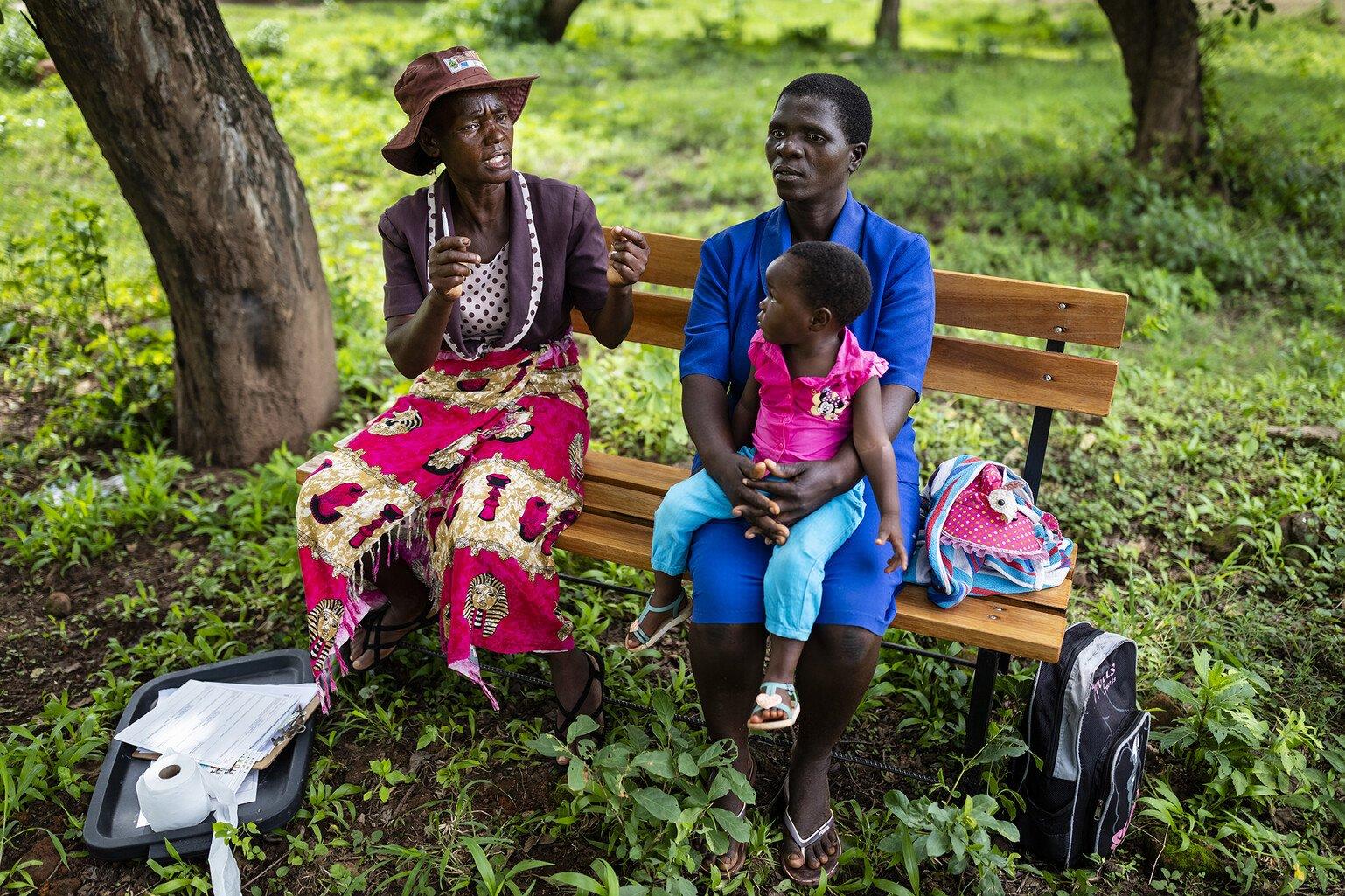
A new decade for science and research
As we publish our annual report, Julia Gillard, Chair of Wellcome, shares her outlook on the critical role for science in solving urgent health challenges facing everyone.

Brent Stirton
Elizabeth Mapaire is a volunteer in the Zaka area. Here she talks to Sophia Nyamuwngi, who had been feeling suicidal after her husband left her. Elizabeth referred her to a more experienced counsellor, and talked to her again later about potential support measures.
About this series
Through Zimbabwe’s Friendship Bench programme, trained volunteers counsel people with depression and other problems using principles from cognitive behavioural therapy – in the informal setting of a chat on a bench.
Brent Stirton / Wellcome Photography Prize 2021
As we enter 2023, the global pandemic, geopolitical tensions, the climate crisis, entrenched inequality and turbulence in the world economy continue to put lives under acute pressure and strain.
As a former prime minister, I appreciate the immense difficulty that comes with balancing and addressing these kinds of challenges – some familiar, others novel.
Yet I remain hopeful that progress is possible. We can save and improve lives, with science as the foundation stone of our brightest beacon of hope.
The global response to Covid-19 shone a light on the potential of science and research to create life-saving tools and secure the route out of one of the most severe health crises in generations.
However, progress only became possible when policymakers chose to grab those life-saving tools with both hands and deploy them at scale.
As the new year gets underway, it is a good time to reflect on the lessons of the pandemic and ask ourselves some fundamental questions about the role of science in our world.
Is putting science at the centre only for emergencies when health problems have spiralled out of control? Or can we more effectively realise its potential by investing in science and advocating for its value and use before, during and after these crises.
At Wellcome, we enter 2023 with clear answers to these questions built on our experience to date.
Today, we publish our annual report which details our work and what we have learned. It shows we spent a record £1.4 billion funding life-changing science and advocating for putting the new knowledge it unlocks into action.
Research is unlocking brand new discoveries
It is exciting and energising to see what the scientific community can achieve with this kind of resource.
For example, we saw the emergence of a breakthrough treatment for schizophrenia. Supported through early trials by Wellcome, it now has the potential to transform the lives of millions of people around the world.
Research in The Gambia found that heat stress can negatively affect foetuses whose mothers are working in extreme temperatures. This finding should further motivate action to mitigate climate change, as well as providing important evidence to help develop adaptation solutions that reduce its impact.
Using gene-editing, doctors pioneered a world-first treatment for leukaemia. The innovative technique could now herald advances in tackling other types of cancer and revolutionise patient care.
These are a fraction of the transformative results that Wellcome has supported science to deliver.
Record funding to deliver our mission
Thanks to the resilience of our investment portfolio, 2023 marks the first year in our plan to spend £16 billion on science over the next decade.
This includes funding new research to transform our understanding of life, health and wellbeing.
We will be announcing new awards for discovery research, where the only limit is imagination.
Here, our independence allows us to take an innovative approach. These projects do not have to focus on short-term horizons or what can get published the fastest. Instead, we want to give researchers the time and resources they need to generate knowledge that leads to a shift in understanding or delivers new insight into how human life and health work. Be that in 10 years, 20, or 100.
Complementing this is our steadfast commitment to advance more immediate solutions in the areas of climate and health, infectious disease and mental health, as their burden continues to escalate.
We will support research that generates new evidence on how climate change is affecting people’s health, where diseases come from and what causes them to spiral out of control, and how mental health problems like anxiety, depression and psychosis develop and resolve.
Given our aim is to help science solve the urgent health challenges facing everyone, Wellcome is taking an increasingly global approach. We’re funding research in countries and communities most affected, working with partners from government, industry and civil society to promote and support inclusive science, and advocating for putting newly generated research and knowledge into action.
Through Wellcome Collection our work extends to bringing wider understanding of the diverse experiences of health around the world.
We are also redoubling efforts to embed equity, diversity and inclusion in our work, both as a funder and an employer. We know we have fallen short on this work to date and we must do better to be true to our aim of addressing all of humanity’s most pressing health needs.
A decade of possibilities
In our turbulent and fragmented world, the challenges we face are many.
However, I am confident that the decade ahead is also one of possibility. A decade of discovery and solutions, in which science charts for us new ways to stay well, heal and live to the fullest.
At Wellcome, that sense of promise excites and motivates us, and we are keen to share it with you.

